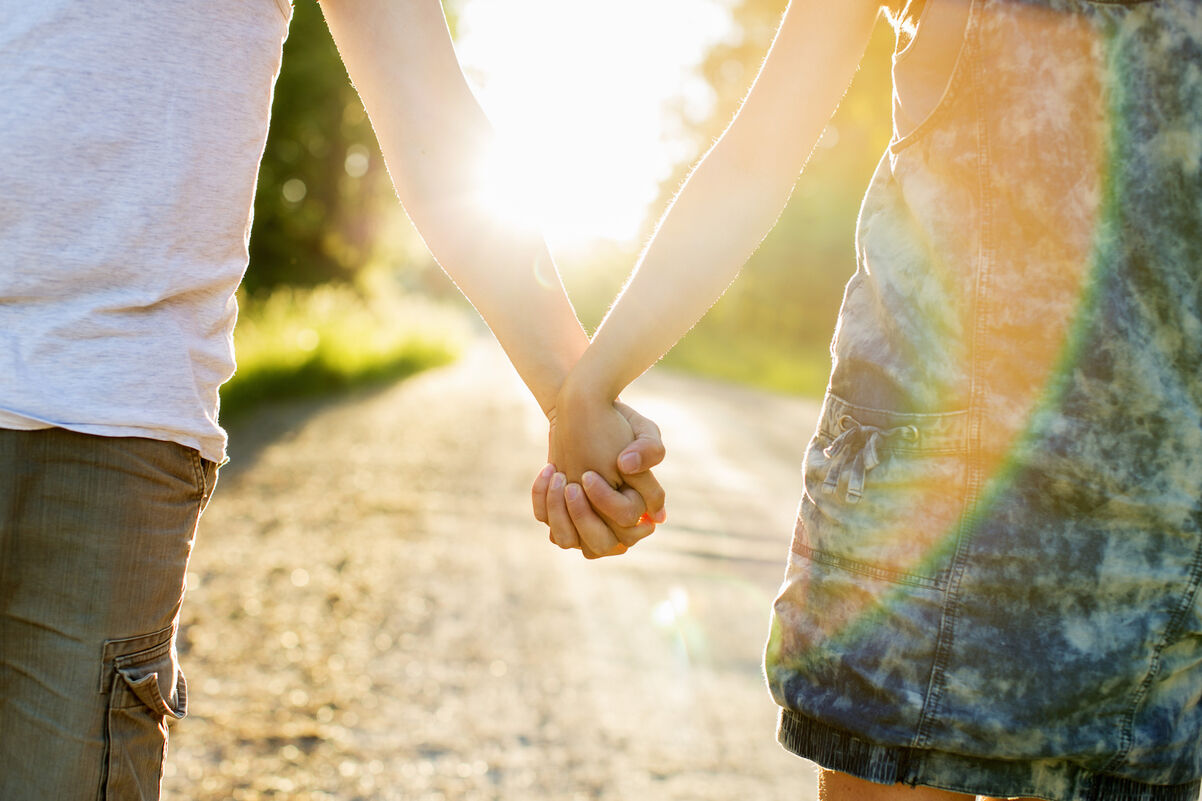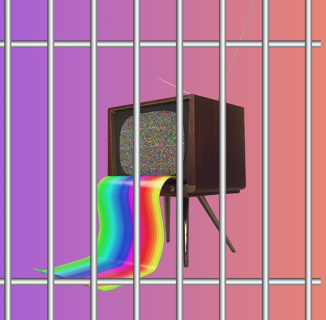Rebecca picks through a tangle of hoops and dangly earrings at the jewelry rack in Claire’s. The earrings are uniformly tacky. It’s 2005. Teen aesthetics are just emerging from the Lizzie McGuire school of accessorizing, where you throw a bunch of shit on, wrap a feather boa around it and call it a day.
But Rebecca knows the magic password. The pink glittery Hellmouth coughs up its treasures. “These ones,” she beams, handing me a pair of cubic zirconia studs. They’re the ones I would have picked, but Christmas shopping for jewelry is not something a teen boy in rural Oklahoma should be caught dead doing. Even if the jewelry is for my sister, a fact I feel I must repeat often and loudly.
So Rebecca does it for me.
“These ones,” I agree, acting like I can’t distinguish one pair from another because of my boy eyes, which only see monster trucks and boobs. I pull her close. She’s wearing her cheerleader varsity jacket, December cold clinging to the pleather. Her curly blonde hair is stiff with product. I brush it away from her face to kiss her. Her kisses are glossy and warm. I love her, but part of me hates this.
Rebecca is, like, three leagues above me. This is an accepted fact in my high school, where my looks place me firmly in the “charity case” sector. We met through MySpace. Some troll was calling her ugly in her anonymous comment widget, and I told her I thought she was beautiful. We started dating shortly after that. Relationships haven’t been so straightforward since then.
We do all the disgusting, saccharine things one expects from two high school freshmen who’ve decided it’s them against the world. We make out in the mall. We buy each other little gifts when we have the money. She wears my hoodies to class. We feverishly write elaborate notes about how much we miss each other from a few doors down the hall.
Every moment apart feels wide and forever, and seeing her again feels like a joyful reunion. The world is huge when you’re that young and that infatuated, even in a town as small as ours. I can honestly say we were in love. As in love as two dumb kids can be, anyway.
When I revisit my time with Rebecca now, as an openly gay man, I struggle to parse out my feelings. To this day, my relationship with her, which spanned over a year, has been my longest. Come to think of it, it was perhaps the most mutual. I’ve never been in love with a man who loved me back, though unreciprocated dynamics litter my tragic baby gay years.
I’ve explored the possibility I might be bisexual. My relationship with Rebecca hints I at least have the capacity to love a woman romantically. I don’t believe that sexuality is static, that its psychic territory can really be completely explored. I believe it can only be crudely mapped, as one might do in a strange, foreign place.
But I know now there is a gravity to wanting someone. It pulls you in and, if things work out, you can let go and let things fall into placehands here, mouth there, touching where you want to touch, guided by desire.
I never felt that with her, and have never felt that for a woman. With her, in dark, empty movie theaters, in the rare moments we had alone, I had to try. I had to try really hard. In some cases, I had to force myself.
That isn’t to say it was torture. I enjoyed our physical intimacy as a matter of touch. But I always closed my eyes, fled my body, and let my mind go elsewhere. I think I hoped her touch would have a transformative effect on me. I hoped if I committed enough, then it would make me straight. It did not.
I never explicitly came out to her. I was in college by the time I came out to myself. By then, we hadn’t spoken in years. And yet I thought of her, because I was embarrassed. I felt as though I had tricked her, that the lights had suddenly come on and exposed me as a fraud. I felt ashamed. I felt my very existence had retroactively robbed her of something she had considered real. “Sorry,” I was saying, simply by being gay. “That was acting.” I felt selfish for coming out at all.
Eventually, anger overtook embarrassment. I wasn’t angry with her. Or maybe I was. There were these occasional pensive nights when I would walk home from the gay bar and marinate in bitterness. Head down, watching my feet on the sidewalk, I would imagine who I might be if my youth had been mine. In that queer alternate universe, Rebecca and I would never have dated. In that sense, I resented her.
It’s not uncommon for gay lives to be partitioned into “pre” and “post.” The narrative tells us our true lives begin after we come out. A gay man might say, for example “I’ve been to Paris,” but then, “I wasn’t out yet. I need to go again.” Those of us with the luxury of being completely out are offered the opportunity to experience the world anew, with our whole selves, whereas before we could not. Everything from our previous lives, if it is to be authentic, must be experienced again.
Only, I can go to Paris again. Some things will always be there. Paris waits. London waits. The gay bars wait and the drag shows aren’t going anywhere. After we come out, many gays fly off to Never-Never Land in search of the spoils of youth, a do-over. It’s either radical or depressing. I haven’t decided which. The point is, Paris waits.
Love, though. That stupefying, puppy love, the kind that only flourishes in an uncomplicated youth, does not wait. It is squandered, and then it is gone. No matter how much money we make and no matter how many men we sleep with. That was my thinking, anyway. And that’s why I was upset with the world that had paired me with Rebecca.
Misogyny also impacted how I felt about her, though I wasn’t aware of it and wouldn’t admit it. I cast her as the heterosexual intruder, whose womanly wiles would have ensnared me into a rote suburban script if I had been straight. We would have had a wedding, the one we had planned, and we would have had two kids, and we would have been “normal,” had my truth not won out.
That misogyny pervades gay male narratives about women and girls like Rebecca. We call them beards. We are awarded gold stars for having never touched them. We steal men away from them in movies, from their clutches, rescuing them. Rebecca became a character in my movie. She became one-dimensional, antagonistic, eventhe embodiment of the fakeness I had to embrace to survive.
I remember watching a movie with the first man I ever dated. Some awful guy I shouldn’t have been with. We cuddled up and watched Big Gay Musical, a frolicking, campy affair that should not be taken seriously. But in its “Adam and Steve” bit, it casts Eve as the original homophobe. She can’t stand the gays, who are gifted with creativity and fabulosity, and she envies them. She conspires against them. She convinces other men to hate them. I see Rebecca in those characterizations. Or rather, I see the way I used to think about her.
It never entered my realm of possibilities that Rebecca herself might have been queer. I have no evidence to suggest she was, but the fact I was so positive it couldn’t be the case suggests I wasn’t interested in rendering her as a three-dimensional person.
And even if she wasn’t, who was I to say her sexuality was facile and rudimentary? That her wants and motives and desires were, compared to my great tragedy, unimportant?
I had decided, as men regardless of their sexual orientation often do, that she was a secondary character in my script.
I deemphasized the memories of her I used to cherish. Memories of us talking well after midnight, my phone pressed between my cheek and my shoulder as I blinked myself awake. We said nothing, enjoying each other without words. “You still up?” she’d say, or I’d say, and I remember being happy.
So much of her has faded away that now all I can really remember with clarity is that making her happy felt good. She would light up. She has this super expressive face. I remember wanting to do that for her again and again, and I remember genuinely looking forward to being around her. It’s a rare thing, regardless of your circumstances, to trust someone who trusts you. I had that.
I still think of that day in Claire’s, too. It’s not a world I’d ever willingly step back into, and it typically only resurfaces in my nightmares. I was miserable. I was hiding from myself and from the world around me. And yet, that specific moment is a warm memory, one I enjoy revisiting. Nostalgia is strange. It’s a pleasant ache.
Thinking about her still confuses me. She was part of a life I used to have, a life I don’t feel I really lived. It was some other person, and I was hidden in his shell. Sometimes the question creeps up again. When I feel lonely, when I feel bitter. What do I do with the life I should have had?
But that question is perhaps a trap. I didn’t have it, so it was never mine. Mourning something that only exists in the negative seems like a waste of energy.
I look instead to what I did have: my time with Rebecca. It was a time when I was deeply confused, when I hadn’t yet made sense of myself and the world had denied me the freedom to find out. But it’s a time I now cherish, despite its flaws, because I spent it with a person whom I genuinely loved.
Help make sure LGBTQ+ stories are being told...
We can't rely on mainstream media to tell our stories. That's why we don't lock our articles behind a paywall. Will you support our mission with a contribution today?
Cancel anytime · Proudly LGBTQ+ owned and operated
Read More in Culture
The Latest on INTO
Subscribe to get a twice-weekly dose of queer news, updates, and insights from the INTO team.
in Your Inbox















